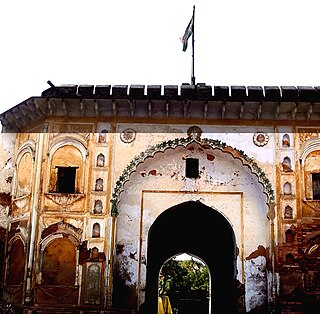Related Research Articles

Charan Singh, better known as Chaudhary Charan Singh, was an Indian anti-colonial nationalist, secular humanist, social democrat, and author who was a central figure among the agrarian community in India during late 1970s and early 1980s. Singh was principally known for his land and agricultural reform initiatives. He briefly served as the 5th prime minister of India from July 1979 to August 1979 and was Member of Parliament (MP) for Baghpat. During prime ministership he was a member of the Janata Party (Secular). Singh also briefly served as deputy prime minister of India from January 1979 to July 1979 as a member of the Janata Party. Singh is widely regarded as the "Champion of farmers", after his life has been dedicated to advocating for the wellbeing and rights of farmers. He is the first leader outside the Indian National Congress who formed government in the northern India and became 5th chief minister of Uttar Pradesh.

The United Provinces of Agra and Oudh was a province of India under the British Raj, which existed from 22 March 1902 to 1937; the official name was shortened by the Government of India Act 1935 to United Provinces (UP), by which the province had been commonly known, and by which name it was also a province of independent India until 1950.

The Central Provinces and Berar was a province of British India and later the Dominion of India which existed from 1903 to 1950. It was formed by the merger of the Central Provinces with the province of Berar, which was territory leased by the British from the Hyderabad State. Through an agreement signed on 5 November 1902, 6th Nizam Mahbub Ali Khan, Asaf Jah VI leased Berar permanently to the British for an annual payment of 25 lakhs rupees. Lord Curzon decided to merge Berar with the Central Provinces, and this was proclaimed on 17 September 1903.

Nawab Muhammad Amir Khan (1769–1834) was a military general in the service of Yashwantrao Holkar of the Maratha Empire and later became the first ruler of the princely state of Tonk. Amir Khan was a Hindustani Pathan and a North Indian Muslim. Born and bred in Sambhal, Amir Khan was the son of a Zamindar in Uttar Pradesh, Hayat Khan, while his grandfather Taleh Khan was a Pashtun from the Salarzai tribe of District Buner in modern-day Pakistan who had migrated to and acquired land in Rohilkhand.

Govind Ballabh Pant was an Indian freedom fighter and the first chief minister of Uttar Pradesh. Alongside Mahatma Gandhi, Jawaharlal Nehru and Vallabh Bhai Patel, Pant was a key figure in the movement for India's Independence and later a pivotal figure in the Indian Government. He was one of the foremost political leaders of Uttar Pradesh and a key player in the successful movement to establish Hindi as the official language of Indian Union.

Allahabad High Court, officially known as High Court of Judicature at Allahabad, is the high court based in the city of Prayagraj, formerly known as Allahabad, that has jurisdiction over the Indian state of Uttar Pradesh. It was established on 17 March 1866, making it one of the oldest high courts to be established in India.

The North-Western Provinces was an administrative region in British India. The North-Western Provinces were established in 1836, through merging the administrative divisions of the Ceded and Conquered Provinces. In 1858, the Nawab-ruled kingdom of Oudh was annexed and merged with the North-Western Provinces to form the renamed North-Western Provinces and Oudh. In 1902, this province was reorganized to form the United Provinces of Agra and Oudh. Allahabad served as its capital from 1858, when it also became the capital of India for a day.

The United Provinces (UP) was a province of British India and, subsequently, independent India.

Sadabad is a town and a nagar panchayat in Hathras district in the Indian state of Uttar Pradesh.

Akhilesh Yadav is an Indian politician and national president of the Samajwadi Party who served as the 20th Chief Minister of Uttar Pradesh. Having assumed the chief minister's office on 15 March 2012 at the age of 38, he is the youngest person to have held the office till date. Yadav is the Leader of Opposition in the Uttar Pradesh Legislative Assembly since March 2022, the incumbent Member of Parliament for Kannauj in the 18th Lok Sabha, and an elected Member of Legislative Assembly for Karhal in the 18th Vidhan Sabha.

Lieutenant Colonel Saeed ul-Mulk Nawab Sir Muhammad Ahmad Said Khan, Nawab of Chhatari also generally referred to as Nawab of Chhatari was Governor of the United Provinces, Chief Minister of United Provinces, President of the Executive Council of the Nizam of Hyderabad and Chief Scout of India.

The first legislative assembly election for the Madras Presidency was held in February 1937, as part of the nationwide provincial elections in British India. The Indian National Congress obtained a majority by winning 159 of 215 seats in the Legislative Assembly. This was the first electoral victory for the Congress in the presidency since elections were first conducted for Madras Legislative Council in 1920. The Justice Party which had ruled the presidency for most of the previous 17 years was voted out of power. The assembly was constituted in July 1937 and C. Rajagopalachari (Rajaji) became the first Congress Prime Minister of Madras.

Provincial elections were held in British India in the winter of 1936–37 as mandated by the Government of India Act 1935. Elections were held in eleven provinces - Madras, Central Provinces, Bihar, Orissa, the United Provinces, the Bombay Presidency, Assam, the North-West Frontier Province, Bengal, Punjab and Sind.

The following outline is provided as an overview of and topical guide to Uttar Pradesh:

The history of Uttar Pradesh, a state in India, stretches back several millennia. The region shows the presence of human habitation dating back to between 85,000 and 73,000 years ago. Additionally, the region seems to have been domesticated as early as 6,000 BC.

The Emblem of Uttar Pradesh is the official seal of the government of the Indian state of Uttar Pradesh. The emblem was originally designed in 1916 for the then United Provinces of Agra and Oudh and continued in use following Indian Independence in 1947.
References
- ↑ Soundings in Modern Southern Asia History. University of California Press. 1968. p. 9.
- ↑ The Congress Party in India: Policies, Culture, Performance. (1991). India: Deep & Deep Publications.
- ↑ Brijesh Singh. Comprehensive Modern Indian History: From 1707 To The Modern Times. S. Chand Publishing. p. 311. ISBN 9789355016577.
- ↑ Ayesha Jalal (1994). The Sole Spokesman. Cambridge University Press. p. 29. ISBN 9780521458504.
- ↑ "The Emissary's Tweet". The Emissary. September 14, 2021.
- ↑ Sisson, Richard; Wolpert, Stanley (20 April 2018). Congress and Indian Nationalism The Pre-Independence Phase. Univ of California Press. p. 318. ISBN 9780520301634.
- ↑ Pai, Sudha (2007). Political Process in Uttar Pradesh Identity, Economic Reforms, and Governance. Pearson Longman. p. 48. ISBN 9788131707975.
- ↑ "PROVINCIAL GOVERNMENTS (MINISTERS). (Hansard, 19 April 1937)". Parliamentary Debates (Hansard) . 19 April 1937.